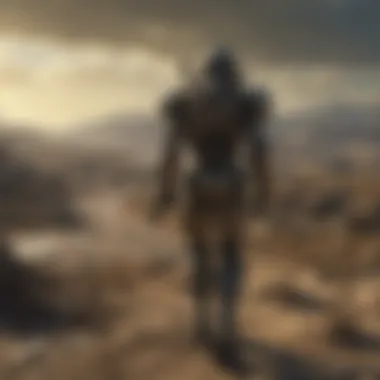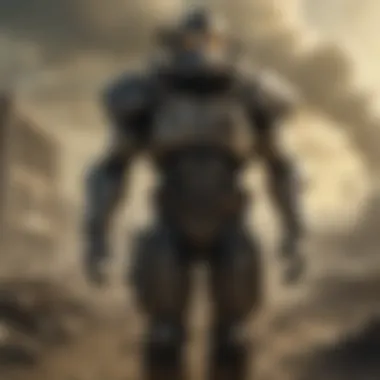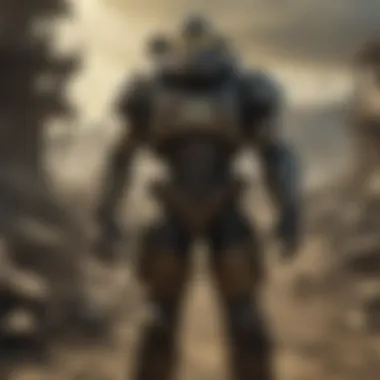Analyzing the 2021 Fallout Movie: Insights and Impacts


Intro
The 2021 Fallout movie has sparked a conversation that extends far beyond mere cinematic adaptation. Its relationship to the broader Fallout universe weaves a rich tapestry of lore, character dynamics, and historical context. While the film opens its doors to newcomers, it also serves as a nostalgic wellspring for long-time fans entwined in the franchise's complex narrative threads. In this exploration, we’ll peel back the layers, highlighting key points about its narrative structure, character evolution, and the themes that echo throughout the series. All this sets the stage for understanding how the movie fits within the expansive Fallout universe.
Lore Insights
Overview of the Fallout Universe
The Fallout universe occupies a unique niche in science fiction. It portrays a dystopian future shaped by nuclear war, where remnants of civilization struggle to survive under the grim shadow of fallout shelters and mutated creatures. Central to its charm is the juxtaposition of 1950s Americana with grim realities of a post-apocalyptic world. Here, every corner holds a story, and every character, no matter how minor, has a place in the lore.
Key Historical Events in the Fallout Timeline
When delving into the timelines, several hallmark events are paramount:
- The Great War (2077): This catastrophic nuclear event sets the stage for the Fallout stories.
- The emergence of the Vaults: These underground shelters serve as a sanctuary for a select few, shaping social dynamics post-war.
- The rise of prominent factions: From the Brotherhood of Steel to the New California Republic, different groups compete for power and survival.
Each of these moments is enriched by the movie, which deftly pulls from the established lore while introducing new elements, breathing fresh life into familiar narratives.
Deep Dive into Major Factions and Characters
One cannot discuss Fallout without touching on its rich cast of characters and factions. The film expands upon characters like the Brotherhood of Steel, who are not merely warriors but also custodians of knowledge. Their interactions with the world outside the Vaults introduce layers of ethical dilemmas and existential questions. Moreover, characters like the Lone Wanderer or the Sole Survivor bring personal stories that resonate within the larger political and social chaos of the Fallout universe. The movie does well to honor these dynamics while crafting its narrative.
Character Analysis
Detailed Profiles of Iconic Characters
The film isn't short of iconic figures either. Take, for example, the character of the ghoul. Historically, ghouls symbolize humanity's transformation through tragedy. The 2021 adaptation nails this theme, exploring their fear of rejection and their desire for acceptance in a world where they have been cast aside.
Relationships between Characters
The interplay between various characters adds depth and emotional weight. Whether through allyships or betrayals, each relationship serves as a commentary on survival in a fractured world. The juxtaposition of loyalty against self-preservation creates a rich narrative soil.
Character Development across the Fallout Franchise
Another notable point is the development arc many characters undergo across the games, which the film adeptly mirrors. As audiences see familiar characters evolve in response to their harsh environments, it invites them to witness growth stemming from the darker aspects of human nature.
Fan Theories and Speculations
Popular Fan Theories about the Fallout Universe
Rumors abound when it comes to the Fallout franchise. One of the more captivating theories postulates that the events seen in the movie may serve as a precursor to a coming game installment. Fans speculate about how the new narrative threads can bridge gaps left in earlier games.
Discussion on Unresolved Plot Points
Often, the loose ends left from past games creep into fan discussions. The 2021 film addresses some of these, aiming to provide clarity while leaving just enough mystery for audiences to ponder over. This tug-of-war between resolution and enigma adds to the anticipation surrounding future content.
Predictions for Future Installments
With the movie setting a vivid stage, rumors regarding the next game intrigue the community. Some theorists suggest that the cinematic adaptation will lead into a significant game update or a stand-alone release, tying-fans old and new into speculating over what might come next.
"In the intricate dance of survival post-war, it’s often the stories of lost souls and their struggles that resonate the strongest."
In summarizing the Fallout movie of 2021, it is evident that it does not merely rehash established stories but rather expands and enriches the existing lore, making it a significant artifact for fans and a solid entry point for newcomers. Once viewers dig into its complexities, the movie serves as a touchstone for discussions about identity, survival, and the eternal quest for belonging within a world that has fundamentally altered.


Narrative Overview of the Fallout Movie
Examining the narrative overview of the Fallout movie from 2021 is not just about recounting events; it's about understanding how the story weaves into the cherished lore of the franchise. This section lays the groundwork for recognizing the film's significance, exploring how it mirrors themes present in the video games while also attempting to carve out its own identity. For both long-term fans and newer audiences, this overview sets the stage for deeper discussions about characters, themes, and the broader impact on the Fallout universe.
Setting the Scene
In the aftermath of a nuclear apocalypse, the world of Fallout is anything but ordinary. Imagine a landscape littered with the remnants of civilization, where society has crumbled but some semblance of life has sprung forth amidst the chaos. The movie captures this essence beautifully, setting the stage in a desolate yet strangely captivating environment. The rusted cars and dilapidated buildings become a character of their own, telling stories of the past while the sun sets over a horizon peppered with flickering lights of Vaults.
The visual tone is gritty and raw, drawing viewers in to experience the bleakness and resilience that characterize life after the end of the world. Lush green fields and bustling cities have vanished, replaced by the remnants of what once was. The cinematography heightens this sense of despair, making the audience feel the weight of loss even as characters strive to find their place in this new reality.
Plot Synopsis
The plot revolves around an unexpected hero emerging from the confines of a Vault, tasked with navigating this harsh new world. We follow the protagonist, a resourceful survivor, as they grapple with the overarching dangers of mutated creatures and ruthless raider gangs. What begins as a quest for personal survival quickly evolves into a mission to uncover hidden truths about their past and the mysterious events leading up to the apocalypse.
As the timeline unfolds, the protagonist encounters a medley of characters—each with their own motives and pasts—who shape their journey in unpredictable ways. Through various challenges, allegiances are formed and tested, ultimately asking deeper questions about sacrifice and humanity. The script balances moments of intense action with reflective dialogues, giving viewers a richly layered narrative that invites them to ponder the moral complexities of survival.
Main Themes
In the backdrop of thrilling escapades, the film intricately weaves several themes that resonate poignantly with the current socio-political climate. The struggle of survival permeates every scene, reminding the audience that while the world may end, the fight to live on is an intrinsic human trait. Moreover, the notion of identity is explored, highlighting how individuals redefine themselves in the ashes of their former lives.
The impact of choices plays a central role as characters confront their decisions, reflecting the broader philosophical question—what does it mean to be human in an inhumane world? Here, personal growth and moral dilemmas create a rich tapestry of narratives that echo the very heart of the Fallout series.
"In the ruins of our past, we forge our future."
Addressing themes of community and trust, the film invites a closer look at the bonds formed amidst adversity, showcasing how chaos can lead to alliances, friendships, and sometimes betrayal. This engaging interplay not only elevates the story but also mirrors the collaborative, often contentious dynamics seen in the games.
Character Analysis
Understanding the character dynamics is crucial in unpacking the essence of the Fallout movie. Characters serve as the pivotal threads weaving the narrative and themes together. Each persona embodies distinct traits and motivations, influencing not only the plot trajectory but also the emotional connection viewers forge with the film. Analyzing these characters sheds light on how the film innovatively extends the rich lore of the Fallout universe, while ensuring both seasoned fans and newcomers grasp the significance of their journeys.
Protagonist's Journey
The protagonist in the Fallout movie serves as a microcosm of struggle, growth, and the quest for identity. Unlike a typical hero set in a pristine world, they are thrust into a harsh post-apocalyptic setting that is as much a character as any human being. This pedestrian initially faces internal conflict, grappling with the remnants of a former life overshadowed by loss and destruction. Their arcs evoke a sense of realism, set against a backdrop that mirrors the bleakness of human existence.
A pivotal moment comes when they encounter moral dilemmas that demand tough choices. This contributes depth to their character, highlighting themes of survival and sacrifice. Importantly, audiences are prompted to reflect on how far they might go when faced with a morally ambiguous landscape. The protagonist's progress is fleshed out through key interactions, decision-making, and the gradual unraveling of their backstory, illustrating a transformation that resonates on multiple levels.
Antagonist's Role
The antagonist adds another layer of complexity to the narrative, challenging the protagonist in myriad ways. Rather than a clear-cut villain, they exhibit traits that blur the lines between right and wrong, prompting the audience to question the traditional view of good and evil. This depth cultivates an engaging plot twist; the antagonist often holds a philosophical stance that, though twisted, is compelling and offers insights into their motives.
Fans of the Fallout series will recognize elements that resonate with the ethical ambiguities of the game lore, asking whether the antagonist’s actions stem from a misguided attempt at governance or a grim vision for humanity’s future. This character brings forth key discussions about power, fear, and control, paralleling broader themes seen throughout the series. Their interactions with the protagonist serve not only to advance the plot but also to challenge the protagonist’s beliefs, ensuring that the confrontations are not mere brawls but existential debates.
Supporting Characters Dynamics
Supporting characters play a stealthy yet impactful role in enriching the storyline. Each brings unique perspectives and personal stakes that mirror the movie’s core themes, unfolding a mosaic of relationships that reflect the complexities of survival in a fractured world. These characters serve as both allies and foils, pushing the protagonist while also complicating their journey.
Not to be overlooked, every supporting figure often represents archetypes familiar to the Fallout community. You have the sarcastic sidekick, the enigmatic scavenger, and even the grizzled mentor. Through their interactions, light is shed on the various survival strategies individuals adopt in dire circumstances, as well as how these personalities morph amidst adversity. Their development enhances the protagonist's journey, allowing for emblematic exploration of camaraderie and betrayal.
Visual and Auditory Elements
The significance of visual and auditory elements in the 2021 Fallout movie cannot be overstated. These elements are not just enhancements; they are essential components that shape the viewer’s experience and guide their emotional responses. When it comes to a richly developed universe like that of Fallout, which is known for its vast landscapes and deep storytelling, the way these elements are executed can either elevate the film or leave a gaping void where immersion should be. Let’s explore the components of cinematography, soundtrack, and special effects separately, but also understand how they intertwine to contribute to the narrative.
Cinematography Techniques
Cinematography serves as the backbone of storytelling in films, particularly in adaptations of video games like Fallout. The 2021 movie employs a variety of techniques that pull viewers into its post-apocalyptic world. For instance, the use of wide-angle shots effectively captures the desolation of the wasteland. Just imagine gazing upon a barren landscape, the sun dipping below a rusted, collapsed building—this not only paints a picture but also evokes a sense of loneliness and adventure, key feelings that the Fallout series embodies.


Another noteworthy aspect is the choice of color grading. The film opts for a washed-out palette with muted tones, reflecting the decay of civilization. This communicates the somber reality faced by the characters. Close-ups are used to convey emotional intensity, allowing the audience to connect with the characters on a personal level.
One cannot forget about the dynamic camera movements utilized during action scenes. Quick cuts and shaky cam techniques create a sense of urgency and chaos, immersing the viewer right in the thick of engagement. These techniques are not mere embellishments; they deepen the narrative’s impact and resonate with the audience, urging them to invest emotionally in the outcome of each scene.
Soundtrack Analysis
The soundtrack of the Fallout movie plays a pivotal role in creating atmosphere and elevating key moments throughout the film. Unlike conventional scores, the music here conjures a retro-futuristic ambiance, tapping into the rich history behind the Fallout series. The blend of orchestral elements with synth sounds harks back to the 1950s aesthetics, featuring artists who whisk you away to an alternate timeline, where America never truly left the fear of nuclear fallout behind.
Composed by an artist well-versed in evoking nostalgia, the tracks possess an ability to stir emotions and highlight the scenes' gravitas. For instance, a sweeping score during a particularly challenging confrontation underscores the stakes at hand, enveloping the viewer in a cocoon of sound that both enhances and complements what is happening visually.
A careful selection of period-specific songs is employed effectively, too. Throwing in a classic piece from the era serves as a way to remind viewers of the worlds past, the comfortable suburbia that contrasts starkly with the present chaos. This juxtaposition builds a heavy sense of irony and drives home the central themes of loss, survival, and the absurdity of human existence amidst ruins.
Special Effects and Settings
Turning our attention to special effects, the film takes a commendable approach to create a believable post-apocalyptic world. From the crumbling buildings to the mutants that roam the wasteland, the effects are crafted to evoke not just awe but a tangible sense of dread. Practical effects are prioritized where possible, grounding scenes in physical reality; it's far more frightening to see a creature lurking in the shadows when it feels real, rather than entirely digital.
The settings themselves also embody the decay of civilization. Filming locations play a crucial role in firstly bringing the Fallout universe to life. Desolate ruins, urban decay, and overgrown vegetation communicate a world that has been radically altered. Attention to detail can be seen in the debris that fills the streets, adding layers of authenticity. This meticulous attention extends to forecasting future technology and its impact on the physical environment, alluding to game mechanics where survival is a constant struggle.
To sum it up, the confluence of visual and auditory elements in the 2021 Fallout movie creates a symphony of immersion that resonates with the audience. The deft execution of cinematography, an evocative soundtrack, and convincing special effects combine to not only tell a story but to entrench the viewer firmly within the Fallout universe.
Comparative Analysis with Video Game Lore
In any discussion about adaptations, especially one as rich and diverse as the Fallout universe, understanding the relationship between film and its source material is essential. A comparative analysis with video game lore offers unique insights into how well the movie respects its origins. With each piece of lore, there are nuances and intricacies intertwined in the gaming experience that can inform or hinder a cinematic interpretation. As viewers observe the Fallout movie, they grapple with their expectations shaped by hours immersed in gameplay. The challenges lie in blending storytelling techniques meant for interactive media with visual storytelling, which inevitably focuses more on narrative pacing and visual appeal.
Adaptation Challenges
Adapting a sprawling video game franchise like Fallout into a film format brings a myriad of challenges. For instance, the game's expansive world-building and lore are often sprawling enough that compressing them into a two-hour narrative can seem like swallowing a whale whole. Would-be filmmakers must choose what to include and what to leave behind.
- Complex Storylines: The game is known for its branching narratives, moral complexities, and player choices. Translating these into a linear format is not just tough; it can also disappoint fans who thrive on their personalized experiences.
- Character Depth: Video games often allow players to invest deeply into their characters’ motivations and backstories. This level of engagement is challenging to replicate in film, where time is of the essence.
- Thematic Richness: Fallout's themes of survival, morality, and society's collapse simmer throughout gameplay. Retaining these layers without overwhelming the audience with exposition is another delicate balancing act.
Beyond those hurdles, there’s also the risk that a film could misinterpret the spirit of the game itself. A successful adaptation will stand as a tribute to the original while forging its own identity.
Lore Consistency
When tackling lore consistency, the aim is to keep the essence of what fans have come to treasure intact. Fallout's lore is deeply entrenched in a blend of dark humor, retro-futurism, and moral quandaries. Any deviation from these established themes could alienate its fanbase. Here are core aspects of lore consistency:
- Character Fidelity: Well-known characters must reflect their established personality traits. If a beloved character finds themselves behaving differently than expected, it can make long-time fans feel disconnected from the adaptation.
- World Rules: Fallout’s post-apocalyptic world operates under specific rules—be it the devastating effects of radiation or the politics of various factions. Maintaining these will lend credence to the film's narrative.
- Cultural References: The games are replete with cultural nods and 'Easter eggs' that form the franchise's identity. A film that ignores these elements might feel detached from the beloved universe.
A successful balance ensures that both gaming veterans and new viewers can appreciate the narrative without feeling lost in translation. It also allows those familiar with the lore to find joy in watching their favorite elements come alive on screen.
Integration of Game Mechanics
One of the most fascinating challenges in adapting a game to film is finding ways to integrate recognizable game mechanics into cinematic storytelling. While games allow for exploration of complex systems, films have to find a different rhythm.
- Action Sequences: Any adaptation must consider how to translate the dynamic action gameplay into gripping visuals. Fans appreciate when beloved mechanics, like V.A.T.S., can be seamlessly incorporated into fight scenes. These moments can invoke a sense of nostalgia while attracting fresh viewers.
- Player Choices: Reflecting player choices offers an additional layer of complexity. For instance, a simple decision made in-game might lead to radically different outcomes. A film that captures this aspect, albeit subtly, shows respect to the original.
- Item Collection and Crafting: Incorporating elements of item collection could create scenes infused with tension and excitement typical of gameplay. The film could show a character gathering resources in dire situations, highlighting survival's urgency.
Understanding how these mechanics can shape the narrative enhances the film's authenticity. The careful selection and integration of these elements could ensure that fans feel a sense of admiration, rather than disappointment.
Overall, a thorough comparative analysis of the Fallout movie with its video game lore helps viewers appreciate the decisions made by the filmmakers, while simultaneously recognizing the dedication required to honor such a rich narrative heritage.
Critical Reception
In any film analysis, critical reception is pivotal in understanding how a piece resonates with audiences and critics alike. For the Fallout movie of 2021, various dimensions of its reception can help pinpoint what worked, what flopped, and how both factions interpreted its essence. Evaluating critical reception entails examining specific reviews, deriving patterns in audience feedback, and gauging the overall legacy that the film leaves behind. This examination can serve as a litmus test to assess the success of cinematic adaptations of video games.
Critical Reviews Overview


When the 2021 Fallout movie hit theaters, critics didn’t pull any punches. Surprisingly, the film received a mixed bag of reviews, showcasing a spectrum of opinions. Some critics hailed it as a much-needed breath of fresh air for video game adaptations, appreciating its rich visual aesthetic and nuanced storytelling. Meanwhile, others found it lacking in depth, feeling that it didn’t quite capture the spirit of the original games. In essence, the reception can be boiled down to a few key aspects:
- Cinematographic Quality: Critics frequently commended the cinematic craftsmanship, exhibiting striking landscapes and compelling visuals. This elevated the film above more cynical adaptations.
- Character Development: Some reviews highlighted the depth given to characters, specifically noting how they evolve throughout the movie. This was a significant shift from typical character portrayals in past game-to-film translations.
- Confusion over Lore: However, a notable criticism was related to the lore. Many fans expressed discontent regarding how the film handled its narrative—arguing that it strayed too far from established canon.
"The cinematography is a marvel, but the heart of Fallout seems left in the wasteland."
Audience Feedback Aggregation
Gathering impressions from the audience can feel like piecing together a jigsaw puzzle. One must sift through a multitude of opinions to discern an overarching sentiment. For the Fallout movie, feedback has been as varied as flavors of ice cream. Most notably, audience ratings on platforms like Rotten Tomatoes and IMDB showcased a significant divide between casual viewers and die-hard fans. Here's how opinions stacked up generally:
- Soaring Expectations vs. Reality: Many expected a film that would be a seamless extension of the game universe. While first-time viewers might enjoy it, longtime fans often argued its shortcomings in faithfully replicating beloved themes and characters.
- Community Response: Conversations on platforms like reddit.com and facebook.com have illuminated a vibrant dialogue. Many fans formed communities to discuss what they loved and disliked, often pointing toward the emotional core of the characters as a focal point in their discussions.
- Mixed Reviews Metric: Surveys conducted across social media revealed that
- Approximately 40% of viewers praised the performances of the cast, particularly highlighting the protagonist's journey.
- Conversely, about 30% expressed they were disappointed due to the plot twists that diverged from what they knew about the Fallout series.
Cultural Impact and Legacy
The 2021 Fallout movie has not just added another layer to the franchise; it has sparked discussions about its influence on the broader cinematic landscape. Its cultural impact reverberates through various aspects of society, igniting debates on storytelling in post-apocalyptic narratives and how they resonate with contemporary audiences. In this section, we’ll delve into the importance of this impact and how it solidifies the film's place in pop culture.
Reflections on Post-Apocalyptic Genre
The post-apocalyptic genre serves as a canvas for exploring human resilience and societal collapse, themes that the Fallout series has long navigated in its game format. With this movie, viewers get to experience these themes in a fresh manner, drawing parallels to real-world issues.
- Human Condition: The film takes a deep bow to human tenacity, encapsulating the struggle for survival against overwhelming odds. The characters' journeys reflect the ongoing battle against individual and societal decay, encouraging audiences to ponder their own resilience in trying times.
- Social Commentary: It doesn't shy from making sharp observations about society today. Issues like governance, morality, and community dynamics come to life, reminding viewers of the thin veneer that separates civilization from chaos.
Influence on Future Adaptations
The success or failure of film adaptations often hinges on how they balance fidelity to source material while innovating enough to captivate a new audience. The Fallout movie stands as a reminder that there’s much to gain when done right. Its influence can be observed in several areas:
- Quality Storytelling: Future adaptations may prioritize weaving deeper narratives. Filmmakers might follow this film’s approach of building a rich backstory that enhances character arcs and situational choices, giving viewers a reason to invest emotionally.
- Enhanced Visual Experiences: With the success of the film’s visual style, it could push other adaptations to improve their aesthetics and leverage new technology, such as improved CGI, to create immersive experiences. The tactile quality of the Fallout universe might inspire similar approaches in other franchises.
Fan Reactions and Community Response
Fans have always played a crucial role in shaping the legacy of any franchise. The Fallout movie ignited myriad fan reactions that reflect their hopes, expectations, and engagement with the material:
"The film captured the essence of what Fallout is about—survival, companionship, and the moral labyrinth in between. It’s a celebration of the lore we’ve grown up on."
— Fan comment from Reddit
This enthusiasm indicates that, while some segments of the fanbase critiqued certain deviations from the source material, most embraced the movie’s ambition.
- Community Dialogue: Online forums and social media channels have thrummed with discussions about key scenes, thematic elements, and character motivations. Fans have rallied to dissect and share theories, fostering a sense of community that aligns with the shared experience of the Fallout games.
- Creative Expression: Many fans have taken to creating fan art, rewriting narrative arcs, or making videos. There's an evident eagerness to continue the conversation, ensuring that the Fallout universe's legacy lives on. This organic extension of engagement has only solidified the movie’s role in the franchise and empowered fans to be part of its evolving history.
In summary, the cultural impact and legacy of the Fallout movie transcends its runtime. It resonates deeply within the post-apocalyptic genre and sets a benchmark for future adaptations while galvanizing an active fan community passionate about the franchise. This interplay of narrative and audience engagement ensures that Fallout remains a vibrant topic of discussion long after the credits roll.
Closure
As we wrap up our exploration of the 2021 Fallout movie, it's essential to recognize the multifaceted impact this film has on both the franchise and the broader cinematic landscape. The conclusion serves as a pivotal moment, bringing together insights from the narrative, character development, and thematic elements that have been dissected throughout the article. It acts as a bridge, linking the film to the larger universe of Fallout, while also highlighting its individual significance.
Summing Up the Experience
In hindsight, the film presents a unique experience that resonates with both longtime followers of the Fallout series and those who may be dipping their toes into this post-apocalyptic world for the first time. The characters, deeply flawed and multifaceted, draw viewers into their struggles and triumphs, showcasing the essence of survival in a world turned upside down.
- Character Arcs: From the determined protagonist navigating through desolate landscapes to the charismatic supporting cast, the character development is steeped in the existential dilemmas that have always been at the core of Fallout storytelling.
- Theme Relevance: Central themes of resilience, morality, and the human condition shine through the narrative. Audiences are left pondering the moral grey areas that the characters navigate—a hallmark of the Fallout universe.
"The Fallout movie serves as a lens through which we can examine our own world, drawing parallels with its satirical elements and cautionary tales."
Additionally, the film's aesthetic choices provide a rich auditory and visual experience. The cinematography captures the stark beauty of a world ravaged by atomic fallout, while the soundtrack evokes nostalgia for gamers attuned to the original series' unique soundscape.
Moreover, this adaptation marks a significant moment in the evolution of video game narratives within cinema. By engaging with the lore while making necessary alterations for the film medium, the creators have managed to respect the franchise’s legacy while carving out a new story for audiences to chew on.
In understanding the film's reception critically and among fans, one can conclude that the 2021 adaptation indeed lays groundwork for future projects. As the genre of video game adaptations continues to grow, Fallout stands not only as a tale of survival but also as a commentary on humanity itself, teasing out questions about our environment, ethics, and identity in an ever-changing world.
This journey through the Fallout movie reveals not just a remarkable cinematic addition but also a reflection of cultural values that resonates far beyond its post-apocalyptic setting. Ultimately, the film challenges us to reflect and engage, serving as a testament to why adaptations of beloved video game franchises can resonate powerfully with audiences, inviting them to reimagine their own narratives in a world rife with possibilities.







